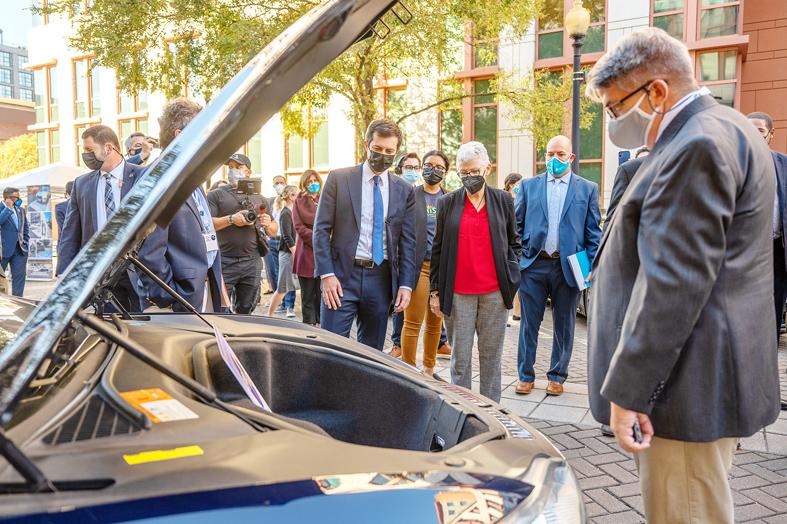Tesla Inc’s third-quarter profits more than quadrupled on sharply higher sales, despite a global semiconductor shortage that has plagued the auto industry, according to results released on Wednesday.
The electric vehicle (EV) maker headed by CEO Elon Musk posted a record profit of US$1.6 billion for the three-month period, as revenue surged 57 percent year-on-year to US$13.8 billion.
Tesla also delivered a record 241,391 vehicles during the period, with sales significantly ramping up in North America and China.

Photo: Bloomberg
The results suggest that Tesla’s output has been less affected by the global shortage of semiconductors than some rival automakers that have shuttered factories or cut production.
However, the company said that chip shortages, as well as congestion at ports and rolling blackouts, “have been impacting our ability to keep factories running at full speed.”
“We believe our supply chain, engineering and production teams have been dealing with these global challenges with ingenuity, agility and flexibility that is unparalleled in the automotive industry,” Tesla said in the accompanying news release.
Tesla notched slightly lower revenue on the sale of EV regulatory credits to other automakers compared with the same period last year.
The company also reported a US$51 million impairment related to its bitcoin investment.
However, profit margins expanded, even as the company alluded to uncertainties amid the lingering supply chain challenges.
“We continue to run our production lines as close to full capacity as conditions allow,” Tesla said. “While sequential growth remains our goal, the magnitude of growth will be determined largely by outside factors.”
The EV maker said its “gigafactory” near Berlin — its first European plant, which is expected to ultimately produce about 500,000 vehicles per year — is expected to receive final permit approval by the end of the year, while another gigafactory in Austin, Texas, is “progressing as planned,” it said.
Tesla is nearing assembly of its first production line vehicles in Austin and Berlin, but the “hardest work lies ahead” in ramping up output, Tesla chief financial officer Zack Kirkhorn said on an earnings call.
Tesla has completed a shift to its factory in Shanghai, China, being its main hub for export vehicles, freeing up other plants to provide more vehicles for Europe and North America, Tesla executives said.
The company’s stated goal is to get on pace to produce millions of vehicles annually.
“There appears to be quite a profound awakening of desirability for electric vehicles,” Kirkhorn said. “It’s called us a little bit off guard. Folks want to buy an electric car and folks want to buy a Tesla right now. It’s very exciting for us.”
CFRA Research analyst Garrett Nelson said that the strong results were already priced into Tesla shares, describing the trading action as “muted.”
Moreover, the company’s statement that the magnitude of its growth “’will be determined largely by outside factors gives investors pause,” Nelson said.
Tesla shares dipped 1.3 percent to US$854.40 in after-hours trading on Wednesday.
Shares have risen more than 25 percent in the past two months.

MULTIFACETED: A task force has analyzed possible scenarios and created responses to assist domestic industries in dealing with US tariffs, the economics minister said The Executive Yuan is tomorrow to announce countermeasures to US President Donald Trump’s planned reciprocal tariffs, although the details of the plan would not be made public until Monday next week, Minister of Economic Affairs J.W. Kuo (郭智輝) said yesterday. The Cabinet established an economic and trade task force in November last year to deal with US trade and tariff related issues, Kuo told reporters outside the legislature in Taipei. The task force has been analyzing and evaluating all kinds of scenarios to identify suitable responses and determine how best to assist domestic industries in managing the effects of Trump’s tariffs, he

TIGHT-LIPPED: UMC said it had no merger plans at the moment, after Nikkei Asia reported that the firm and GlobalFoundries were considering restarting merger talks United Microelectronics Corp (UMC, 聯電), the world’s No. 4 contract chipmaker, yesterday launched a new US$5 billion 12-inch chip factory in Singapore as part of its latest effort to diversify its manufacturing footprint amid growing geopolitical risks. The new factory, adjacent to UMC’s existing Singapore fab in the Pasir Res Wafer Fab Park, is scheduled to enter volume production next year, utilizing mature 22-nanometer and 28-nanometer process technologies, UMC said in a statement. The company plans to invest US$5 billion during the first phase of the new fab, which would have an installed capacity of 30,000 12-inch wafers per month, it said. The

Taiwan’s official purchasing managers’ index (PMI) last month rose 0.2 percentage points to 54.2, in a second consecutive month of expansion, thanks to front-loading demand intended to avoid potential US tariff hikes, the Chung-Hua Institution for Economic Research (CIER, 中華經濟研究院) said yesterday. While short-term demand appeared robust, uncertainties rose due to US President Donald Trump’s unpredictable trade policy, CIER president Lien Hsien-ming (連賢明) told a news conference in Taipei. Taiwan’s economy this year would be characterized by high-level fluctuations and the volatility would be wilder than most expect, Lien said Demand for electronics, particularly semiconductors, continues to benefit from US technology giants’ effort

‘SWASTICAR’: Tesla CEO Elon Musk’s close association with Donald Trump has prompted opponents to brand him a ‘Nazi’ and resulted in a dramatic drop in sales Demonstrators descended on Tesla Inc dealerships across the US, and in Europe and Canada on Saturday to protest company chief Elon Musk, who has amassed extraordinary power as a top adviser to US President Donald Trump. Waving signs with messages such as “Musk is stealing our money” and “Reclaim our country,” the protests largely took place peacefully following fiery episodes of vandalism on Tesla vehicles, dealerships and other facilities in recent weeks that US officials have denounced as terrorism. Hundreds rallied on Saturday outside the Tesla dealership in Manhattan. Some blasted Musk, the world’s richest man, while others demanded the shuttering of his